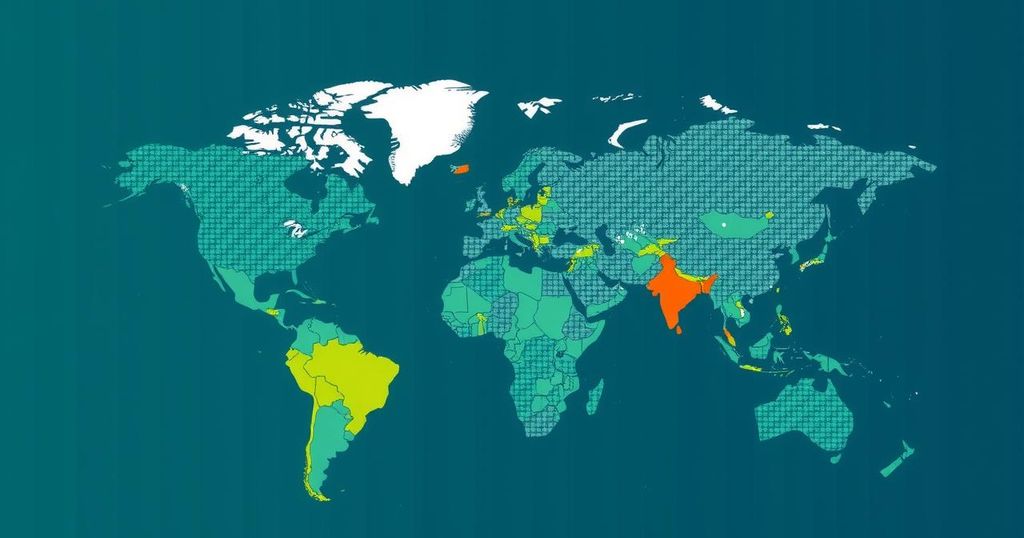Election Year 2024 Highlights Decline in Global Climate Commitment

The unprecedented 2024 election year reveals a concerning decline in global commitment to climate action, with significant electoral wins for climate skeptics like Donald Trump overshadowing urgent climate discussions. While countries such as the UK lean toward progressive climate policies, many respond to economic concerns by sidelining environmental issues, signaling a troubling trend in addressing the climate crisis amid political and economic turmoil.
The 2024 election year has surfaced alarming trends regarding global commitments to addressing the climate crisis. Despite ongoing environmental disasters and record temperatures, there exists a discernible decline in prioritization towards climate action across various nations. Significant electoral victories for climate skeptics, including Donald Trump in the United States and right-wing parties in Europe, highlight a broader regression in climate policies, as urgent discussions concerning rising temperatures are overshadowed by issues like inflation and energy pricing.
As the globe experiences what is anticipated to be the hottest year on record, climate change remains a peripheral concern in most political discourse, except notably in India. The recent elections have seen a surge in right-wing parties opposing climate initiatives, which they term as economically burdensome. This shift is emblematic of a larger trend wherein climate activism, once at the forefront, is now relegated to a secondary status amid pressing economic worries.
Experts note that this year’s electoral results reflect not only a stagnation but a regression in global climate momentum. While nations like the UK demonstrate a positive direction in climate commitment through progressive party platforms advocating for clean energy, many other regions exhibit a disturbing shift towards populism that undermines climate priorities. These changes in political dynamics signify that climate issues are increasingly perceived through the lens of cultural and economic divides, complicating the global response to urgent environmental challenges.
The recent COP29 climate summit, taking place amid considerable political turbulence, exemplifies the stagnation in international climate negotiations. States like Azerbaijan, which hosted the summit, and Argentina, expressing dissent over international climate agreements, underscore the ongoing challenges in achieving unified climate action. Activists have expressed frustration over wealthy nations’ reluctance to provide necessary climate funding for vulnerable countries, contrasting starkly with their proclamations of leadership in climate action. These revelations contribute to a growing sentiment of disillusionment among advocates for environmental stewardship, as they confront the reality of dwindling time for impactful climate action.
Even while some advancements in renewable energy growth have been noted, the overarching narrative remains one of urgency and the need for immediate action. The trajectory of current political leadership could significantly affect future global climate initiatives.
The current global political landscape is critically intertwined with the climate emergency. As the United Nations designates 2024 as a pivotal election year, the intertwining of electoral politics and climate policy has become increasingly evident. While nations have pledged commitments to address climate change, recent electoral victories for populist leaders and parties that prioritize economic concerns over environmental sustainability show a stark contrast to the urgency required by the climate crisis. Historical context shows that public engagement, such as with activists like Greta Thunberg, was once more pronounced; however, it has waned post-pandemic, illustrating the complex relationship between public attention and pressing global issues.
In conclusion, the trends observed during the 2024 election year reveal a worrying decline in global commitment to climate action, even with escalating climate crises impacting various regions. While certain political shifts have fostered hope for cleaner energy initiatives, the broader inclination towards populism and economic prioritization suggests an urgent need for climate advocates to recalibrate their strategies. The current trajectory, characterized by political reluctance and a lack of actionable commitment, underscores the critical nature of the climate challenge looming over future generations.
Original Source: www.theguardian.com







